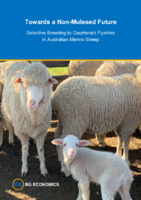
nsw Minister ignores sheep suffering and community concerns, leaving industry to charter own way forward on the controversial practice of mulesing
Joint Media Statement – FOUR PAWS Australia, Humane Society International Australia
9 November 2022 – Today, a public petition submitted to the NSW parliament calling for regulation to end the mulesing of sheep and require mandatory pain relief for all surgical interventions was effectively dismissed by the NSW government. This is a disappointing outcome for animal welfare in the wool industry.
This petition mattered because each year over 10 million lambs suffer the painful procedure known as mulesing while pain-free strategies to combat fly strike are already well established and successfully in use by many wool growers.
What’s more, global brands and consumers are increasingly demanding non-mulesed wool, with over 300 brands stating their opposition to the practice. But the market can only achieve so much to end cruel practices.
Despite strong demand for non-mulesed wool, in the absence of regulation, only a minority of Australian wool growers have switched to breed flystrike-resistant sheep that do not need to be mulesed.
Note: Any advertisements that may appear during the viewing of this video are unrelated to FOUR PAWS. We assume no liability for this content.
In response to the NSW parliamentary petition, animal welfare groups FOUR PAWS Australia and Humane Society International Australia called on the NSW Government to:
- Institute policies that incentivise and support woolgrowers to transition away from mulesing with selective breeding of plain-bodied sheep;
- Introduce a phase-out of mulesing in the Animal Welfare Bill 2022 that allows producers adequate time to transition to flystrike-resistant flocks; and
- Mandate pain relief, as is the case in Victoria, for any mulesing that is performed prior to the legislated phase-out.
The government supports voluntary adoption of pain relief and technical assistance to move away from mulesing but has deflected the call for regulation.
The new Sheep Sustainability Framework National Producer Survey (October 2022) revealed that only 8% of wool growers surveyed are administering anaesthetic in conjunction with an analgesic at mulesing, which offers the best pain management solution for the procedure.
For mulesing, the main pain-relieving product is only effective if applied after the folds of skin have been cut away from the lamb’s breech and tail areas.
“The survey proves the need to mandate adequate pain relief for all invasive procedures, the need to educate wool growers on the use of appropriate and effective pain-relieving products, as well as the need for growers to transition to available pain-free alternatives such as breeding sheep which do not need to be mulesed. This was a missed opportunity by the NSW Government, with the outcome putting the NSW wool industry out of step with community expectations and brand demands for higher welfare standards,” says Medcalf.
With a viable solution at hand, robust accreditation schemes now available, and consumers continuing to call for an end to mulesing, an increasing number of retailers and brands, including Adidas, Calvin Klein, Kathmandu, Country Road Group and H&M, are committing to source verified non-mulesed wool and changing their policies to phase it out.
“With such poor animal welfare provisions in place for Merino sheep and the growing controversy these painful procedures are attracting, Australia’s dominant position in the luxury fibre market is not guaranteed. Meeting consumer demands for animal welfare is simply good business and can help to safeguard Australia’s wool industry for future generations,” says Dolphin.
Major wool-producing countries in South America as well as New Zealand and South Africa, no longer mules their sheep which only puts Australia at an increased reputational risk. While state governments prevaricate, the organisations are calling for an urgent upgrade to the national Standards and Guidelines for Sheep to mandate immediate pain relief during painful surgical procedures and phase out of mulesing.
Background
Mulesing annually causes more than 10 million Merino lambs in Australia to suffer fear, stress and acute pain. This pain can last several days to several weeks and leaves a wound which can take weeks to heal.
While done to protect sheep from a condition called flystrike, there are alternative ways to manage this issue that are pain free, and doing so can result in high financial returns to producers. Good sheep genetics can end both flystrike and the need for mulesing.

Towards a Non-Mulesed Future
The independent report by BG Economics shows financial benefits for farmers who have changed to breed sheep that don’t need mulesing and are naturally protected from flystrike. The report helps to build confidence that this flystrike management solution is possible, as well as profitable for wool growers, and a welfare win for sheep.
FOUR PAWS urges fashion brands to take action and ensure their down supply chain is free from mulesed wool, and ideally transition to animal-free alternatives.

Elise Burgess
Head of CommunicationsM: 0423 873 382
FOUR PAWS Australia
GPO Box 2845
SYDNEY NSW 2001
Main Phone: 1800 454 228
Follow us on social media
Stay up to date on this topic and on all FOUR PAWS activities on our social media channels:
About FOUR PAWS
FOUR PAWS is the global animal welfare organisation for animals under direct human influence, which reveals suffering, rescues animals in need and protects them.
Founded in 1988 in Vienna by Heli Dungler and friends, the organisation advocates for a world where humans treat animals with respect, empathy and understanding. The sustainable campaigns and projects of FOUR PAWS focus on companion animals including stray dogs and cats, animals in fashion, farm animals, and wild animals – such as bears, big cats, and orangutans – kept in inappropriate conditions as well as in disaster and conflict zones.
With offices in Australia, Austria, Belgium, Bulgaria, France, Germany, Kosovo, the Netherlands, Switzerland, South Africa, Thailand, Ukraine, the UK, the USA, and Vietnam as well as sanctuaries for rescued animals in eleven countries, FOUR PAWS provides rapid help and long-term solutions. www.four-paws.org.au

